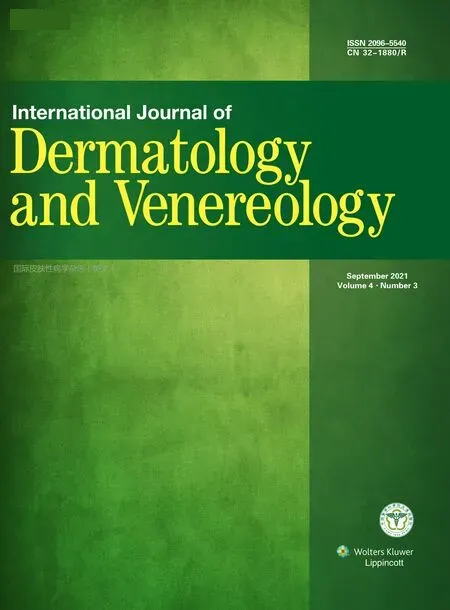Mask on Followed by Gloves on:Do We Have a Choice?
Dear Editor:
On23July2020,China reported a case of domestically transmitted COVID-19in a58-year-old man who worked for a seafood-processing company.The patient was confirmed to be SARS-CoV-2–positive.The patient had no contact history;however,previously published data indicated that some fish had tested positive for SARS-CoV-2,and we therefore considered that SARS-CoV-2might have been transmitted to this patient through such contact.Meanwhile,the Centers for Disease Control and Prevention reminded the population that citizens should wear gloves when touching frozen or chilled food.Wearing a mask and gloves thereafter seemed to become the“new normal”in life.Although masks appeared to be an effective way to stop the spread of COVID-19,healthcare workers facing higher intensities of SARS-CoV-2were becoming infected even with their masks on.1Thus,a question arises:If we must wear gloves,why should we?Could there be other protection method instead of gloves?
The goal of mask-wearing policies is to prevent the transmission of SARS-CoV-2via the respiratory tract.Are glove-wearing policies thus implemented to prevent the transmission of SARS-CoV-2via the skin?Wearing a mask only reduces,but does not eliminate,the risk of infection by SARS-CoV-22;the virus might also be transmitted in other ways.Could the skin be one of these transmission routes?A well-known line in Chinese medicine is that“the skin is the twin of the lung.”This saying might represent ancient wisdom indicating that the skin could be a bridge of SARS-CoV-2transmission.
There is evidence supporting the necessity of wearing gloves.Angiotensin-converting enzyme2(ACE2)is the receptor of SARS-CoV-2and is essential for viral entry into cells.Xue et al.3reported that ACE2can be expressed in the skin.This gives the virus an opportunity to enter cells.Notably,however,ACE2is mainly expressed in the basal layer of the skin,which is located below multiple layers of strongly connected keratinocytes.4-5This suggests a limited possibility that SARS-CoV-2can travel through a well-constructed skin barrier.However,what if the skin barrier is compromised?Deterioration of the skin barrier is observed in many patients with inflammatory skin conditions.Could an inflammatory skin condition with deterioration of the barrier function be a specific circumstance allowing SARS-CoV-2to be transmitted via the skin?Atopic dermatitis is a representative example of an inflammatory skin disease associated with a deteriorated barrier function,6and elevated levels of ACE2are detected in the lesions of patients with this disease.7In our own research,we have similarly found elevated ACE2levels in the skin lesions of patients with psoriasis.Another factor associated with entry of SARSCoV-2into cells is transmembrane serine protease2(TMPRSS2),which primes the viral spike proteins to allow viral entry into the target cell.The mRNA level of TMPRSS2was elevated in mouse models of inflammatory skin conditions with deteriorated skin barrier functions.Additionally,after application of fluorescein isothiocyanate-conjugated SARS-CoV-2spike protein to the skin of mice,spike protein deposition was detected in the mice with deteriorated skin barrier function and inflammatory skin conditions but was hardly detected in the mice with normal skin.
All of the above results suggest that an inflammatory skin condition with barrier dysfunction may be a specific circumstance that allows SARS-CoV-2to be transmitted through the skin.However,these data are not solid enough8;they do not actually verify whether that SARSCoV-2can be transmitted through the skin.Fortunately,however,the development of in vivo imaging systems9and humanized ACE2mouse models have provided the opportunity to definitively prove whether SARS-CoV-2 can be transmitted through the skin.Thus,we encourage researchers to further examine the possible routes of SARS-CoV-2transmission.Being a backup of gloveswearing force or seeking for other protection instead of gloves?What is your choice?
Yours Qian-Nan Xu and Jie Zheng∗
Department of Dermatology,Ruijin Hospital,School of Medicine,Shanghai Jiaotong University,Shanghai200025,China.
∗Corresponding author:E-mail:jie-zheng2001@126.com.
- 国际皮肤性病学杂志的其它文章
- Mobilization of Melanocytes During NB-UVB Treatment of Vitiligo
- Consensus on the Diagnosis and Treatment of Melasma in China(2021Version)#
- Capsaicin Regulates Mitochondrial Fission to Promote Melanoma Cell Apoptosis
- Oxyresveratrol-induced Activation of Nrf2/HO-1 Signaling Pathway Enhances Ability ofResveratrol to Inhibit UVB-induced Melanin
- Linking Cellular Metabolism to Epigenetics in Melanoma
- Ablative Carbon Dioxide Laser Treatment for Papular Scars of Nose and Chin Due to Acne:A Case Series

